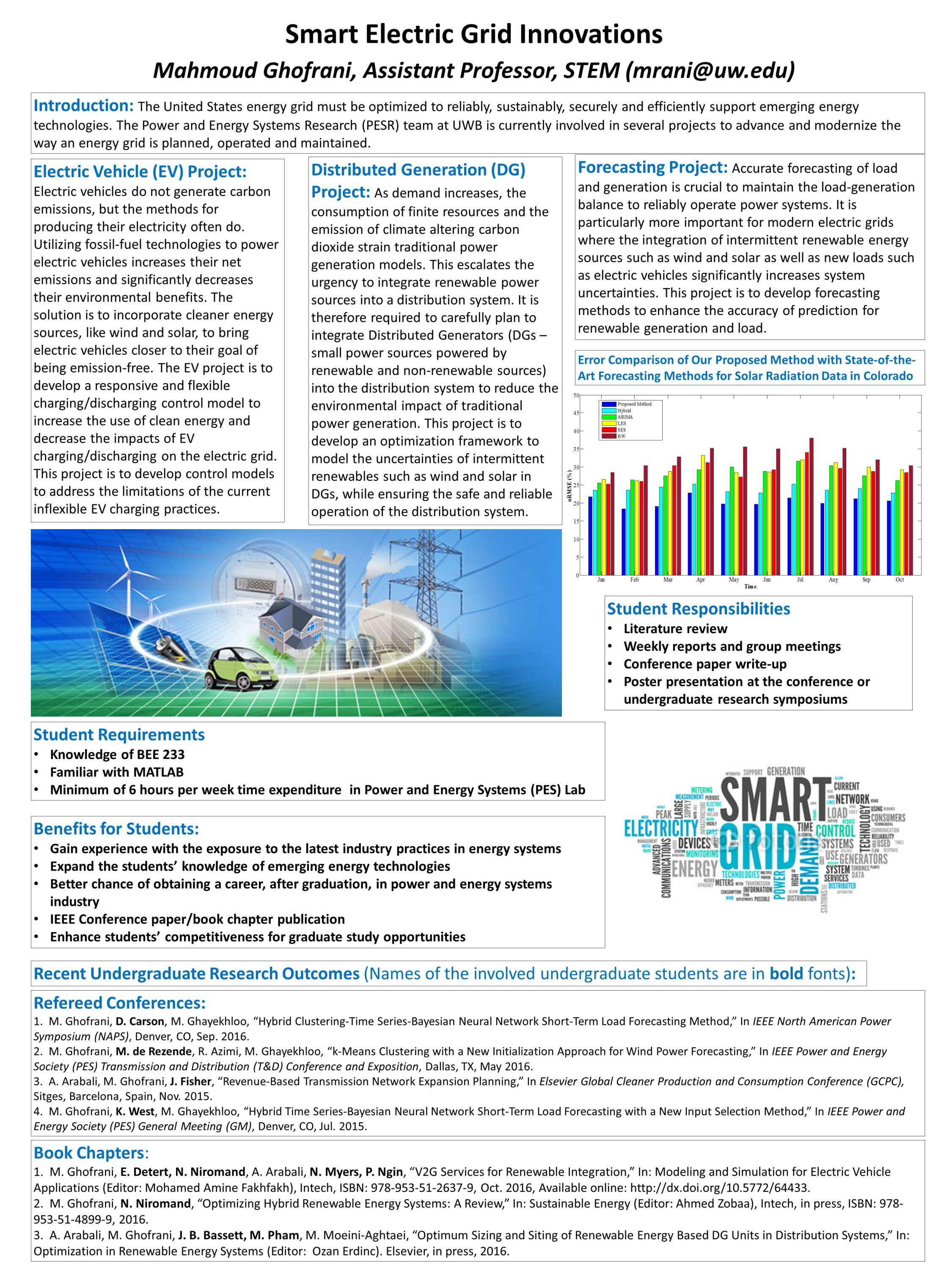Smart Electric Grid Innovations

The United States energy grid must be optimized to reliably, sustainably, securely and efficiently support emerging energy technologies. The Power and Energy Systems Research (PESR) team at UWB is currently involved in several projects to advance and modernize the way an energy grid is planned, operated and maintained.
Electric Vehicle (EV) Project: Electric vehicles do not generate carbon emissions, but the methods for producing their electricity often do. Utilizing fossil-fuel technologies to power electric vehicles increases their net emissions and significantly decreases their environmental benefits. The solution is to incorporate cleaner energy sources, like wind and solar, to bring electric vehicles closer to their goal of being emission-free. The EV project is to develop a responsive and flexible charging/discharging control model to increase the use of clean energy and decrease the impacts of EV charging/discharging on the electric grid. This project is to develop control models to address the limitations of the current inflexible EV charging practices.
Distributed Generation (DG) Project: As demand increases, the consumption of finite resources and the emission of climate altering carbon dioxide strain traditional power generation models. This escalates the urgency to integrate renewable power sources into a distribution system. It is therefore required to carefully plan to integrate Distributed Generators (DGs – small power sources powered by renewable and non-renewable sources) into the distribution system to reduce the environmental impact of traditional power generation. This project is to develop an optimization framework to model the uncertainties of intermittent renewables such as wind and solar in DGs, while ensuring the safe and reliable operation of the distribution system.
Forecasting Project: Accurate forecasting of load and generation is crucial to maintain the load-generation balance to reliably operate power systems. It is particularly more important for modern electric grids where the integration of intermittent renewable energy sources such as wind and solar as well as new loads such as electric vehicles significantly increases system uncertainties. This project is to develop forecasting methods to enhance the accuracy of prediction for renewable generation and load.
Student Outcomes
Gain experience with the exposure to the latest industry practices in energy systems, Expand the students’ knowledge of emerging energy technologies, Better chance of obtaining a career, after graduation, in power and energy systems industry, IEEE Conference paper/book chapter publication, and Enhance students’ competitiveness for graduate study opportunities. Recent Undergraduate Research Outcomes
Student Responsibilities
Literature review, weekly reports and group meetings, conference paper write-up, and poster presentation at the conference or undergraduate research symposiums.
Time Commitment
Minimum of 6 hours per week time expenditure in Power and Energy Systems (PES) Lab.
Refereed Conferences (from poster)
Names of the involved undergraduate students are in bold fonts
- M. Ghofrani, D. Carson, M. Ghayekhloo, “Hybrid Clustering-Time Series-Bayesian Neural Network Short-Term Load Forecasting Method,” In IEEE North American Power Symposium (NAPS), Denver, CO, Sep. 2016.
- M. Ghofrani, M. de Rezende, R. Azimi, M. Ghayekhloo, “k-Means Clustering with a New Initialization Approach for Wind Power Forecasting,” In IEEE Power and Energy Society (PES) Transmission and Distribution (T&D) Conference and Exposition, Dallas, TX, May 2016.
- A. Arabali, M. Ghofrani, J. Fisher, “Revenue-Based Transmission Network Expansion Planning,” In Elsevier Global Cleaner Production and Consumption Conference (GCPC), Sitges, Barcelona, Spain, Nov. 2015.
- M. Ghofrani, K. West, M. Ghayekhloo, “Hybrid Time Series-Bayesian Neural Network Short-Term Load Forecasting with a New Input Selection Method,” In IEEE Power and Energy Society (PES) General Meeting (GM), Denver, CO, Jul. 2015.Student Qualifications: Knowledge of BEE 233, Familiar with MATLAB.
